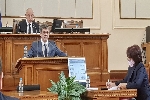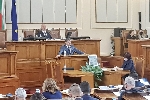News
The Parliament adopted the Report on the Activities of the Commission for Counteracting Corruption and for Seizure of Illegally Acquired Property and the Report on the State of Defence and the Armed Forces of the Republic of Bulgaria for 2019
28/05/2020
The Parliament adopted the Commission's Activity Report for Counteracting Corruption and for Seizure of Illegally Acquired Property for 2019. Of the 177 Members of Parliament who voted, 131 were “in favour”, one “against” and 45 abstained.
The report noted that a total of 166 alerts were received in the Commission last year and proceedings were initiated. The Commission has prepared 162 draft decisions on the substance and on termination and has imposed fines, penalties and asset forfeiture under criminal rulings amounting to BGN 173,511. The Commission has issued 14 decisions establishing a conflict of interest; 87 decisions not establishing a conflict of interest; 61 decisions closing the proceedings.
During the reporting period, the Commission also continued the work on proceedings initiated under the repealed law, under which penalties amounting to BGN 34,027 were imposed. In total, in 2019 (under the two laws – the repealed one and the effective one), the Commission adopted 222 decisions for the submission of claims for the imposition of protective measures in the courts of the country amounting to BGN 848,385,935.79 and with property offered for collateral amounting to BGN 653,388,252.94. During this period, 37 real estates and 119 motor vehicles were seized in favour of the state.
The National Assembly adopted the Report on the State of Defence and the Armed Forces of the Republic of Bulgaria in 2019 by 93 votes “in favour”, 0 “against” and 30 abstentions.
The main conclusion of the report is that the state of defence capabilities of the Bulgarian Armed Forces allows the performance of their tasks, but with limited time and volume. The main factors negatively affecting the state of defence capabilities are the outdated and malfunctioning armaments and equipment and the state of assembly of the units with personnel.
The focus in 2019 was on the modernisation, the gradual growth of defence funds, overcoming the incomplete set of personnel and the combat training. Last year, an important step was made in modernising and technologically rearming the armed forces with the acquisition of eight F-16 fighter aircrafts, unit 70/72, the report noted.
Assembling troops at the end of the year averaged 79.27 per cent of the state staff, and approximately 14 per cent of the voluntary reserve. As a result of measures to increase the attractiveness of the military profession, the trend of increasing vacancies has halted for the first time in several years.
The report proposes directions for the focus of efforts in 2020, such as the implementation of the National Plan to increase defence expenditure to 2 per cent of the GDP of the Republic of Bulgaria by 2024 and the gradual resolution of the non-collection of the armed forces and the voluntary reserve. It is noted that, once the Strategic Review is completed, important decisions on the country's defence are to be taken by 2032.
According to the Chairman of the Parliamentary Defence Committee, Konstantin Popov (Citizens for European Development of Bulgaria Party), the report is objective. “What has really been done in defence, whether it is enough, whether more can be done still – there is always more that can be done. But we cannot fail to take into account the fact that there is a breakthrough in the way of thinking when it comes to army modernisation,” he said. “We cannot fail to count the serious success at both the political and the military-technical levels also,” Gen. Popov said. He also noted the reconstruction of the Georgi Benkovski Higher Air Force School as a success. The restoration of the equipment is definitely envisaged, there are definitely more exercises, suggesting better preparation, he explained.
The Parliament adopted the Activity Report of the Energy and Water Regulation Commission (EWRC) for 2019. Of the 118 Members of Parliament who voted, 90 were “in favour” and 28 abstained. This is the last report of this composition of the Regulator.
The document states that 2019 was a year of accelerated and key changes in all Bulgarian energy sectors. Electricity producers of 1 to 4 MW energy went to the energy power exchange market. There was an “intraday” market alliance with 21 other European countries. The price decisions of the Regulator have ensured the stability of the regulated market. The Commission has established the necessary regulatory framework in the “Natural Gas” sector for the development and the expansion of our gas transmission system and the construction of the Balkan Stream. Natural gas trade has started on the Balkan Gas Hub platform. The Commission recognises that in its price decisions it has consistently applied a balanced and conservative approach taking into account the interests of all the participants and it has not allowed for any sudden price changes.
The priority in the WSS sector for the Commission was the consideration of the business plans of the WSS operators in order to provide regulatory support for the water sector reforms. The total number of companies with approved business plans for the period 2017-2021 is 35, covering 88.4 per cent of the country's population.

Latest news
- 22/04/2021
The Parliament imposed a moratorium on concessions, real estate deals and appointments pending the election of a new cabinet or caretaker government - 16/04/2021
By 156 votes “in favour”, the National Assembly accepted the resignation of the Council of Ministers with Prime Minister Boyko Borisov - 15/04/2021
Speech by Mrs. Iva Miteva upon her election as a President of the 45th National Assembly - 15/04/2021
The Member of Parliament Iva Miteva was elected President of the 45th National Assembly - 15/04/2021
The Members of the 45th National Assembly were officially sworn in - 03/03/2021
The President of the National Assembly Tsveta Karayancheva and MPs attended the solemn fireworks-retreat on the occasion of the Liberation of Bulgaria - 03/03/2021
Every Bulgarian should preserve and honour the memory of those glorious ancestors, thanks to whom Bulgaria exists today, said the President of the National Assembly Tsveta Karayancheva in Gabrovo - 03/03/2021
Today we are on Shipka to pay our respects to all the heroes who sacrificed their lives for freedom, said the President of the National Assembly Tsveta Karayancheva after climbing Shipka Peak together with young people from all over the country - 02/03/2021
The Vice-President of the National Assembly Valeri Simeonov received an award from the Bulgarian Republican Self-Government in Hungary - 26/02/2021
The Parliament adopted at second reading amendments to the Measures Against Money Laundering Act
 Български
Български English
English

